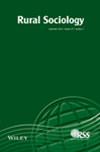杨柳依依:六R土著研究框架--美国土著教师在科学、技术、工程和数学领域的历程*
IF 1.9
3区 社会学
Q2 SOCIOLOGY
引用次数: 0
摘要
美国原住民科学、技术、工程和数学(NAF-STEM)学科的教师人数历来不足。原住民通常生活在农村社区,要为他们创建包容性的学术界,就必须深入了解他们的个人、关系和集体经历。本研究以 "六R "为指导:关系、尊重、责任、相关性、代表性和互惠,并借鉴了土著研究方法。来自部落学院和非部落机构的 12 名 NAF-STEM 受邀在七个研究圈中分享他们的观点和经验。NAF-STEM 参加了为期七周的混合研讨会,学习如何进行定性数据分析。作者对 "研究圈 "的记录进行了分析,寻找与 NAF-STEM 的职业满意度和成功相关的主题。研究结果确定了整体支持系统的重要性,该系统始终关注 NAF-STEM 所面临的机遇和挑战,并强调了在 STEM 中平衡相互尊重的关系、充分的代表性、共同的责任、多样性的相关性和互惠的重要性。通过在整个研究过程中实施 "六个 R",本研究确定了部落和非部落高校在 NAF-STEM 方面的成功经验、支持系统和挑战。这些成果可以为各院校创造一个公平、包容的 NAF-STEM 环境提供参考。本文章由计算机程序翻译,如有差异,请以英文原文为准。
A Growing Willow: The Six Rs Indigenous Research Framework—Stories of the Native American Faculty Journey in STEM*
Native American faculty in science, technology, engineering, and mathematics (NAF‐STEM) disciplines are historically underrepresented. Creating inclusive academia for Indigenous people that typically live and thrive in rural communities requires insights into their personal, relational, and collective experiences. This study was guided by the Six Rs: relationship, respect, responsibility, relevance, representation, and reciprocity, and was informed by Indigenous Research Methodologies. Twelve NAF‐STEM from tribal colleges and non‐tribal institutions were asked to share their perspectives and experiences in seven Research Circles. NAF‐STEM joined sequential hybrid workshops over seven weeks on how to conduct qualitative data analysis. Authors conducted analysis on the transcripts of Research Circles for themes associated with the professional satisfaction and success of NAF‐STEM. Results of the study identified the importance of holistic support systems that remain mindful of both the opportunities and challenges facing NAF‐STEM and emphasize the significance of balancing the need for respectful relationships, adequate representation, shared responsibility, relevance of diversity, and reciprocity in STEM. Through implementation of the Six Rs throughout the research process, the study identified successes, support systems, and challenges of NAF‐STEM at both tribal and non‐tribal colleges and universities. These outcomes can inform institutions to create an equitable and inclusive environment for NAF‐STEM.
求助全文
通过发布文献求助,成功后即可免费获取论文全文。
去求助
来源期刊

RURAL SOCIOLOGY
SOCIOLOGY-
CiteScore
4.60
自引率
13.00%
发文量
47
期刊介绍:
A forum for cutting-edge research, Rural Sociology explores sociological and interdisciplinary approaches to emerging social issues and new approaches to recurring social issues affecting rural people and places. The journal is particularly interested in advancing sociological theory and welcomes the use of a wide range of social science methodologies. Manuscripts that use a sociological perspective to address the effects of local and global systems on rural people and places, rural community revitalization, rural demographic changes, rural poverty, natural resource allocations, the environment, food and agricultural systems, and related topics from all regions of the world are welcome. Rural Sociology also accepts papers that significantly advance the measurement of key sociological concepts or provide well-documented critical analysis of one or more theories as these measures and analyses are related to rural sociology.
 求助内容:
求助内容: 应助结果提醒方式:
应助结果提醒方式:


